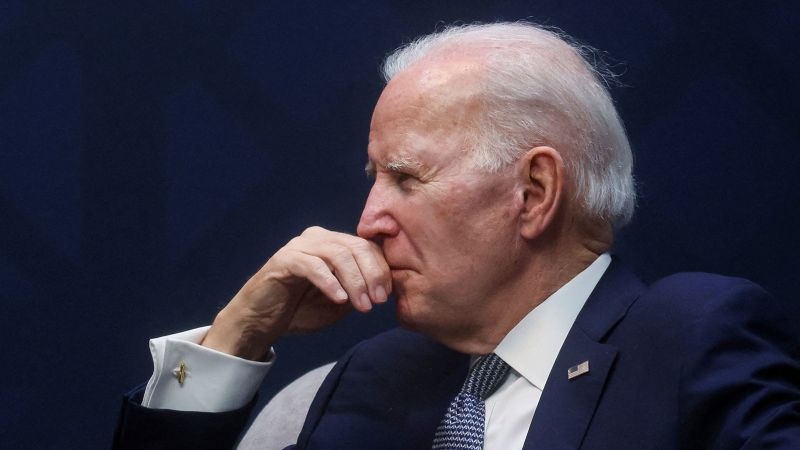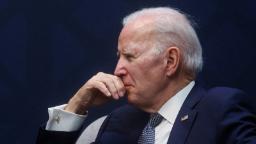CNN
—
President Joe Biden could be damned if he saves the banks or damned if he doesn’t.
Another major industry intervention to prop up a bank on Thursday – not by the government but under the auspices of the administration – underscored the still grave political peril of the sudden crisis that erupted just over a week ago. It also pushed the administration farther onto a fragile limb that could snap if the bank meltdown were to get worse.
Some of the country’s most powerful banks, including JPMorgan Chase, Wells Fargo, Citigroup and Truist, combined to shore up teetering First Republic Bank in a $30 billion cash infusion meant to ease anxiety in the markets, head off a domino effect of more bank failures and demonstrate the industry still has a solid foundation.
This came days after the White House used the Deposit Insurance Fund, a $100 billion facility funded by premiums banks pay to the Federal Deposit Insurance Corporation, to guarantee deposits in Silicon Valley Bank, which collapsed last week, and Signature Bank, which regulators shut down.
The picture here is of the banking industry saving itself – and not of the government bailing out rich bankers whose recklessness put the savings, prosperity and peace of mind of Americans at risk.
It’s a narrative that the president badly needs to stick.
Even so, the administration’s repeated assurances that no taxpayer cash was involved – necessitated by public fury over bailouts after the 2008 Great Recession banking crisis – do set up some potential political vulnerability. While there is no suggestion yet that isolated banking upheaval could mushroom into a major systemic meltdown, any future use of public funds could hand Republicans, who are already inaccurately blasting administration moves as a “bailout,” an opening to lambast Biden.
The events of this week show how the administration is on a knife-edge over the banking crisis – large aspects of which it has no capacity to control. This daunting reality was stressed on Wednesday when problems overwhelmed Credit Suisse, a huge global player whose existing problems were catalyzed into a crisis by the turbulence in the US. It required emergency loan offers by authorities in Berne to stave off a failure that would have had global reverberations.
The situation is so politically dicey for Biden because the most prudent political move in some senses would be to allow small banks like SVB and Signature Bank to fail. Biden has based his entire political mythology on lifting up working- and middle-class Americans, despite long serving as senator for the US finance industry haven of Delaware.
But presidents face multiple and often competing demands on their attention and political capital. Any hesitation about propping up SVB last weekend might have unleashed a chain of consequences that tipped the entire sector into a crisis that would have required a far greater government intervention – and potentially taxpayer-funded bailouts. This would have had disastrous consequences for Biden’s reputation for economic stewardship and the likely reelection campaign that must, to succeed, sketch a case for an American bounce back after the worst pandemic in a century, high inflation and political turmoil.
The roller-coaster ride in the banking sector this week is all taking place in the ominous shadow of the 2008 economic crisis, which is informing a strategy that is based, above all else, on a mantra of no bailouts.
The situations in 2008 and 2023 are not the same. In the former case, the worst financial crisis since the Great Depression was triggered by mountains of subprime mortgages piled up by lax lending practices and easy credit that saddled banks with trillions of dollars in almost worthless loans. The problems last week at SVB, and a subsequent bank run, were caused by managers who invested in government bonds whose prices fell because of the Fed raising interest rates to combat high inflation. In most cases, the assets backing up the bank’s actual business were sound. There is a clear distinction here between the government bailing out bankers and banks in 2008 and what is effectively a federal insurance fund securing depositors now.
Such nuance, however, is lost outside the finance industry. Banking calamities are hard to explain to the public, at least by political leaders who lack the genius for distilling an existential moment into a national rallying the way that President Franklin Roosevelt did during the 1933 banking crisis.
Politics – Biden’s secondary problem after preventing a banking meltdown – rarely reward complexity. Presidential primary campaigns, for instance, profit from simplicity and soundbites and often use fear to trigger momentum. So even a false perception that a president is handing out the cash of taxpayers who are struggling to make ends meet can be political gold.
Treasury Secretary Janet Yellen tried yet again in a high-stakes hearing on Thursday to explain what’s happening now – and why it’s not what happened in the past. Her delicate task was to reassure Americans that the banking system is safe thanks to the administration’s efforts without inviting comparisons to 2008.
“Shareholders and debt holders are not being protected by the government. Importantly, no taxpayer money is being used or put at risk with this action,” Yellen told the Senate Finance Committee.
Her reassurances, however, will not prevent the administration’s critics from seeking to portray the government actions as tantamount to the dreaded “b” word – bailout.
Republican presidential candidate Nikki Haley, for instance, argued this week that “Joe Biden is pretending this isn’t a bailout,” and misleadingly posited that if the Deposit Insurance Fund were to run dry, all bank customers would be on the hook. And she falsely claimed that depositors at healthy banks were being forced to subsidize SVB mismanagement. But unlike Biden, the former South Carolina governor is in the enviable position of being able to criticize without having responsibility.
Another Republican potential candidate, Florida Gov. Ron DeSantis, twisted the situation to claim that the banks’ “woke” preoccupation with diversity, equity and inclusion initiatives had caused the industry to plummet. The conceit advanced the DeSantis strategy of weaponizing a culture war to please conservative base activists. And while it didn’t correctly diagnose the current banking problems, his theory will be solidified in the minds of many Republican voters because of the power of conservative media.
Biden intimately understands the political risks he faces here. As vice president in the Obama administration, he was inside the somber meetings that made fateful decisions about government bailouts after a new president inherited the worst financial crisis in more than 70 years.
Bailouts to banks helped save the US economy but nevertheless stoked a political backlash that nurtured the Tea Party movement, which wiped out House Democrats in the 2010 midterms. It also sowed a festering sense of resentment that was a fertile incubator for ex-President Donald Trump’s economic populism and backlash politics.
Barack Obama wrote in his autobiography, “A Promised Land,” that while Americans early in his term were frustrated with the glacial recovery from the 2008 crisis, “The bank bailout sent them over the edge.”
“Across the political spectrum, voters considered the bank bailouts a scam that had allowed the barons of finance to emerge from the crisis relatively unscathed,” Obama wrote.
Biden’s political future may depend on avoiding such voter fury.








More News
5 Takeaways From the Supreme Court Arguments on Idaho’s Abortion Ban
NATO Puts on a Show of Force in the Shadow of Russia’s War
In Immunity Case, Trump Can Lose in Ways That Amount to a Win